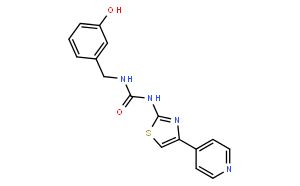| In vitro |
RKI-1447 is a cell-permeable pyridylthiazolyl-urea that acts as a potent, ATP site-targeting Rho Kinase inhibitor, displaying much reduced potency against PKA, PKN1/PRK1, p70S6K/RPS6kB1, AKT1, MRCKa/CDC42BPA (85.5%, 80.5%, 61.9%, 56.0%, and 50.4% inhibition, respectively, by 1 µM RKI-1447) or 15 other kinases. Crystal structures of the RKI-1447/ROCK1 complex reveals that RKI-1447 is a Type I kinase inhibitor that binds the ATP binding site through interactions with the hinge region and the DFG motif. RKI-1447 suppresses phosphorylation of the ROCK substrates MLC-2 and MYPT-1 in human cancer cells, but had no effect on the phosphorylation levels of the AKT, MEK, and S6 kinase at concentrations as high as 10 μM. RKI-1447 is also highly selective at inhibiting ROCK-mediated cytoskeleton re-organization (actin stress fiber formation) following LPA stimulation, but does not affect PAK-meditated lamellipodia and filopodia formation following PDGF and Bradykinin stimulation. RKI-1447 inhibits migration, invasion and anchorage-independent tumor growth of breast cancer cells. [1]
|

 COA
COA MSDS
MSDS HPLC
HPLC NMR
NMR